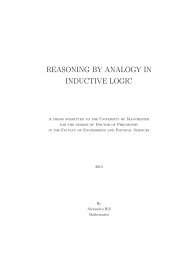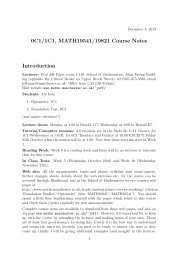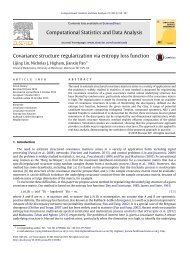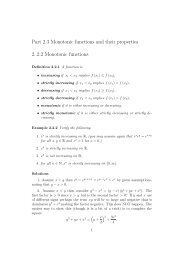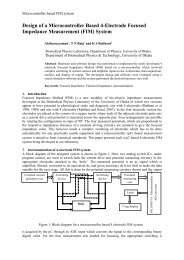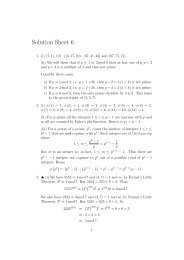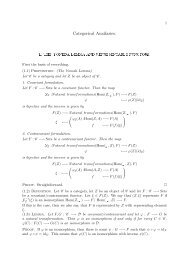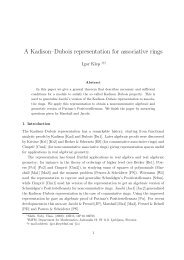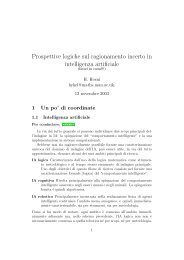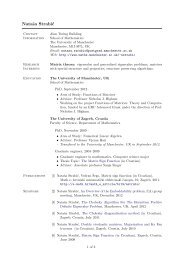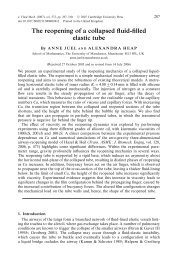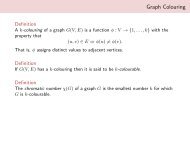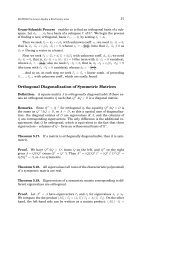5 Adequate sets of connectives: Solutions
5 Adequate sets of connectives: Solutions
5 Adequate sets of connectives: Solutions
Create successful ePaper yourself
Turn your PDF publications into a flip-book with our unique Google optimized e-Paper software.
5 <strong>Adequate</strong> <strong>sets</strong> <strong>of</strong> <strong>connectives</strong>: <strong>Solutions</strong><br />
1. Show that {¬,→} is an adequate set <strong>of</strong> <strong>connectives</strong>.<br />
Solution p∨q is logically equivalent to ¬p → q; p∧q is equivalent to ¬(p → ¬q);<br />
p ↔ q is equivalent to ¬((p → q) → ¬(q → p))<br />
2. The NOR connective has the truth table shown. Determine whether or not<br />
this connective is, on its own, adequate, justifying your answer.<br />
p q pNORq<br />
T T F<br />
T F F<br />
F T F<br />
F F T<br />
SolutionNotethatpNORq isequivalentto¬(p∨q). HencepNORpisequivalent<br />
to¬(p∨p),thatis,to¬p,andwe’vegot¬. Alsop∧q isequivalentto¬(¬p∨¬q)so<br />
this is equivalent to (¬p)NOR(¬q), hence to (pNORp)NOR(qNORq) and we’ve<br />
got ∧ as well. Therefore NOR is adequate.<br />
3. Prove that the connective § with truth table shown below is not adequate.<br />
p q p§q<br />
T T F<br />
T F F<br />
F T T<br />
F F F<br />
Solution We prove by induction on complexity <strong>of</strong> terms, that for any term built<br />
up from a set L <strong>of</strong> propositional variables using § only - let us denote the set <strong>of</strong><br />
such terms by Term§(L) - and for any valuation v, if v(p) = F for every p ∈ L,<br />
then v(s) = F for every s ∈ Term§(L). That will be enough since then there<br />
will be no term in Term§(L) which is a tautology.<br />
Base case (s a propositional variable): this is our hypothesis.<br />
Induction step (just one): Suppose that s = t§u where, by induction, we<br />
may assume that v(t) = F = v(u). Then, consulting the truth table for §, we<br />
see that v(s) = F, as required.<br />
4. Determine whether or not the set {∧,→} is adequate, justifying your answer.<br />
Solution No. We prove by induction on complexity <strong>of</strong> terms, that for any<br />
term built up from a set L <strong>of</strong> propositional variables using → and ∧ only - let<br />
us denote the set <strong>of</strong> such terms by Term→∧(L) - and for any valuation v, if<br />
v(p) = T for every p ∈ L, then v(s) = T for every s ∈ Term→∧(L).<br />
Base case (s a propositional variable): this is our hypothesis on v.<br />
Induction steps (two <strong>of</strong> them): Suppose that s = t → u where, by induction,<br />
we may assume that v(t) = T = v(u). Then v(s) = v(t → u) = T, by the truth<br />
table for →. Similarly v(t∧u) = T.<br />
By induction we conclude that v(s) = T for every term in Term→∧(L). In<br />
particular there is no term in Term→∧(L) which is equivalent to ¬p. Hence<br />
{→ ∧} is not adequate.<br />
5. Prove that the connective ¬ is not adequate.<br />
Solution Let L = {p,q}. We claim that no term in Term¬(L) is logically<br />
equivalent to p ∧ q. To prove this, suppose that s ∈ Term¬(L) is equivalent<br />
14
to p∧q. Then only one propositional variable appears in s (an easy inductive<br />
pro<strong>of</strong>), say p appears. Let v and w be defined by v(p) = T, v(q) = T, w(p) = T,<br />
w(q) = F. Then v(p∧q) = w(p∧q) yet v(s) = w(s), so s is not equivalent to<br />
p∧q, contradiction as desired.<br />
6. What does it mean to say that a set <strong>of</strong> propositional <strong>connectives</strong> is adequate?<br />
Suppose that the propositional <strong>connectives</strong> ∗ and ◦ have the truth tables shown.<br />
Show that {∗,◦} is adequate. (You may use the fact that the set {∧,¬} is<br />
adequate.)<br />
p q p∗q<br />
T T F<br />
T F F<br />
F T T<br />
F F T<br />
p q p◦q<br />
T T F<br />
T F F<br />
F T T<br />
F F F<br />
Solution (Very precise (more so than in the notes) answer to first part): A<br />
set C <strong>of</strong> propositional <strong>connectives</strong> is adequate if for every set L <strong>of</strong> propositional<br />
variables and every term s ∈ SL there is a term t ∈ TermCL such that, for every<br />
functionv0 : L → {T,F}, ifv isthe(unique)extension<strong>of</strong>v0 toavaluationonSL<br />
and w is the unique extension <strong>of</strong> v0 to a valuation on Term(L) then w(t) = v(s).<br />
(Perfectly adequate answer to first part): A set C <strong>of</strong> propositional <strong>connectives</strong><br />
is adequate if for every propositional term s there is a term built using<br />
just the <strong>connectives</strong> in C to which s is logically equivalent.<br />
(Answer to the rest) Note that p∗q is equivalent to ¬p - so we have ¬ - and<br />
that p ◦ q [which we’ve seen already in Question 3] is equivalent to ¬p ∧ q. It<br />
will be enough to produce a term involving ∗ and ◦ which is equivalent to p∧q:<br />
(p∗q)◦q (or (p∗p)◦q) will do.<br />
15



